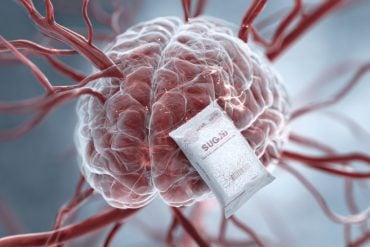Summary: Researchers have developed a new molecule that limits magnesium transport in mitochondria. The drug prevents weight gain and liver damage in mice who were fed a high-sugar, Western-style diet since birth. After exposure to the molecule, overweight mice started to lose weight.
Source: UT Health San Antonio
Researchers from The University of Texas Health Science Center at San Antonio (UT Health San Antonio) have developed a small-molecule drug that prevents weight gain and adverse liver changes in mice fed a high-sugar, high-fat Western diet throughout life.
“When we give this drug to the mice for a short time, they start losing weight. They all become slim,” said Madesh Muniswamy, PhD, professor of medicine in the health science center’s Joe R. and Teresa Lozano Long School of Medicine.
Findings by the collaborators, also from the University of Pennsylvania and Cornell University, were published Feb. 27 in the high-impact journal Cell Reports. Muniswamy, director of the Center for Mitochondrial Medicine at UT Health San Antonio, is the senior author.
Fourth most common element
The research team discovered the drug by first exploring how magnesium impacts metabolism, which is the production and consumption of energy in cells. This energy, called ATP, fuels the body’s processes.
Magnesium is the fourth most abundant element in the body after calcium, potassium and sodium, and plays many key roles in good health, including regulating blood sugar and blood pressure and building bones. But the researchers found that too much magnesium slows energy production in mitochondria, which are cells’ power plants.
“It puts the brake on, it just slows down,” said co-lead author Travis R. Madaris, doctoral student in the Muniswamy laboratory at UT Health San Antonio.
Deleting MRS2, a gene that promotes magnesium transport into the mitochondria, resulted in more efficient metabolism of sugar and fat in the power plants. The result: skinny, healthy mice.
Liver and adipose (fat) tissues in the rodents showed no evidence of fatty liver disease, a complication related to poor diet, obesity and type 2 diabetes.
Small-molecule agent
The drug, which the researchers call CPACC, accomplishes the same thing. It restricts the amount of magnesium transfer into the power plants. In experiments, the result was again: skinny, healthy mice. UT Health San Antonio has filed a patent application on the drug.

The mice served as a model system of long-term dietary stress precipitated by the calorie-rich, sugary and fatty Western diet. The familiar results of this stress are obesity, type 2 diabetes and cardiovascular complications.
“Lowering the mitochondrial magnesium mitigated the adverse effects of prolonged dietary stress,” said co-lead author Manigandan Venkatesan, PhD, postdoctoral fellow in the Muniswamy lab.
Joseph A. Baur, PhD, of the University of Pennsylvania and Justin J. Wilson, PhD, of Cornell are among the collaborators. “We came up with the small molecule and Justin synthesized it,” Madaris said.
Significant implications
“These findings are the result of several years of work,” Muniswamy said. “A drug that can reduce the risk of cardiometabolic diseases such as heart attack and stroke, and also reduce the incidence of liver cancer, which can follow fatty liver disease, will make a huge impact. We will continue its development.”
Funders of this project include the National Institutes of Health, the U.S. Department of Defense and the San Antonio Partnership for Precision Therapeutics.
About this obesity and pharmacology research news
Author: Will Sansom
Source: UT Health San Antonio
Contact: Will Sansom – UT Health San Antonio
Image: The image is in the public domain
Original Research: Open access.
“Limiting Mrs2-dependent mitochondrialMg2+ uptake induces metabolic programming in prolonged dietary stress” by Travis R. Madaris et al. Cell Reports
Abstract
Limiting Mrs2-dependent mitochondrialMg2+ uptake induces metabolic programming in prolonged dietary stress
Highlights
- Mitochondrial Mg2+ channel Mrs2 rheostats MCU Ca2+ signals to maintain bioenergetic circuit
- DNL precursor and cellular Mg2+ chelator citrate curbs HIF1α signal and oxidative metabolism
- Lowering mMg2+ mitigates prolonged dietary-stress-induced obesity and metabolic syndrome
- Mrs2 channel blocker CPACC reduces lipid accumulation and promotes browning and weight loss
Summary
The most abundant cellular divalent cations, Mg2+ (mM) and Ca2+ (nM-μM), antagonistically regulate divergent metabolic pathways with several orders of magnitude affinity preference, but the physiological significance of this competition remains elusive.
In mice consuming a Western diet, genetic ablation of the mitochondrial Mg2+ channel Mrs2 prevents weight gain, enhances mitochondrial activity, decreases fat accumulation in the liver, and causes prominent browning of white adipose. Mrs2 deficiency restrains citrate efflux from the mitochondria, making it unavailable to support de novo lipogenesis.
As citrate is an endogenous Mg2+ chelator, this may represent an adaptive response to a perceived deficit of the cation.
Transcriptional profiling of liver and white adipose reveals higher expression of genes involved in glycolysis, β-oxidation, thermogenesis, and HIF-1α-targets, in Mrs2−/− mice that are further enhanced under Western-diet-associated metabolic stress. Thus, lowering mMg2+ promotes metabolism and dampens diet-induced obesity and metabolic syndrome.







